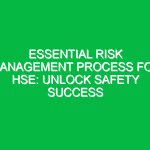Welcome team!
Today, we are going to focus on an essential aspect of our Health, Safety, and Environment (HSE) practices – Battery Handling. Proper battery handling is crucial for our safety and well-being in the workplace. Let’s dive into some key tips and best practices to ensure that we power up our safety every day.
The Importance of Battery Handling
Batteries are a common component in many of our daily operations, from powering tools to equipment. Improper handling of batteries can lead to accidents, injuries, and even hazardous situations. By understanding and following proper battery handling procedures, we can prevent potential risks and create a safer work environment for everyone.
Best Practices for Battery Handling
When it comes to handling batteries, there are several best practices to keep in mind:
- Proper Storage: Store batteries in a cool, dry place away from direct sunlight and extreme temperatures.
- Correct Charging: Follow manufacturer guidelines for charging batteries and avoid overcharging.
- Inspection: Regularly inspect batteries for any signs of damage or leaks.
- Personal Protective Equipment (PPE): Wear appropriate PPE, such as gloves and eye protection, when handling batteries.
By adhering to these best practices, we can minimize the risks associated with battery handling and ensure a safer workplace for all.
Potential Hazards of Improper Battery Handling
Improper battery handling can pose various hazards, including:
- Chemical Exposure: Battery leaks or spills can result in exposure to harmful chemicals.
- Fire Risk: Overcharging or short circuits can lead to fires.
- Physical Injuries: Dropping heavy batteries or mishandling them can cause injuries.
It is essential to be aware of these potential hazards and take necessary precautions to prevent accidents.
Guidelines for Safe Battery Handling
Here are some guidelines to follow when handling batteries:
- Read the Instructions: Always refer to the manufacturer’s instructions for proper battery handling.
- Avoid Mixing Batteries: Do not mix old and new batteries or different types of batteries in the same device.
- Dispose of Batteries Properly: Follow proper disposal procedures for old or damaged batteries.
By following these guidelines, we can ensure that we handle batteries safely and responsibly.
Regulations and Compliance
It is important to be familiar with any regulations or standards related to battery handling in our workplace. Compliance with these regulations not only ensures our safety but also helps us meet legal obligations and maintain a safe working environment.
Conclusion
In conclusion, proper battery handling is a critical aspect of our daily operations. By following best practices, understanding potential hazards, and complying with regulations, we can power up our safety and create a secure work environment for everyone. Thank you for your attention and commitment to safety!


